-
REVIEW06-26-2023
Nursing care directed to burned patients: a scoping review
Revista Brasileira de Enfermagem. 2023;76(3):e20220205
Abstract
REVIEWNursing care directed to burned patients: a scoping review
Revista Brasileira de Enfermagem. 2023;76(3):e20220205
DOI 10.1590/0034-7167-2022-0205
Views0See moreABSTRACT
Objectives:
to identify in the literature and summarize nursing care in a hospital environment directed to patients who suffered burns.
Methods:
a scoping review, according to the JBI Reviewers’ Manual recommendations, with a search in the MEDLINE, CINAHL, Web of Science, Scopus databases and in the Virtual Health Library portal, through articles published between 2016 and December 2021.
Results:
of the total 419 articles found, nine were selected for analysis. The main care measures identified were changing dressings and types of coverage, vital sign control, non-pharmacological techniques for pain relief and opioid reduction.
Conclusions:
the complexity of burn care requires constant updating by the nursing team. Keeping it prepared to carry out the best nursing care practices for burn patients will promote adequate care, patient recovery and reduction of possible harm.

-
ORIGINAL ARTICLE06-26-2023
Searching for human connection to transcend symbolisms in pediatric palliative care
Revista Brasileira de Enfermagem. 2023;76(3):e20220476
Abstract
ORIGINAL ARTICLESearching for human connection to transcend symbolisms in pediatric palliative care
Revista Brasileira de Enfermagem. 2023;76(3):e20220476
DOI 10.1590/0034-7167-2022-0476
Views0See moreABSTRACT
Objectives:
to present a theoretical model for the interactional context of health professionals and families of children and adolescents under palliative care.
Methods:
qualitative study based on the theoretical frameworks of Grounded Theory and Symbolic Interactionism. Ten palliative care professionals took part in this study through semi-structured interviews employing snowball technique from 2020 to 2021.
Results:
the comparative data analysis resulted in the theoretical model “Searching for human connection to transcend symbolisms in pediatric palliative care”. It reveals symbolic elements that substantiate the construction of a collaborative context integrating two phenomena: “Overcoming boundaries and intertwining paths” and “Embracing suffering to weave meaningful experiences”. Symbolisms in palliative care guide the behavior of families and professionals, which makes them the key factor to be managed.
Final Considerations:
symbolisms and suffering continually integrate the interactional experience of professionals. Empathy and compassion are fundamental elements to enable their connection with families.
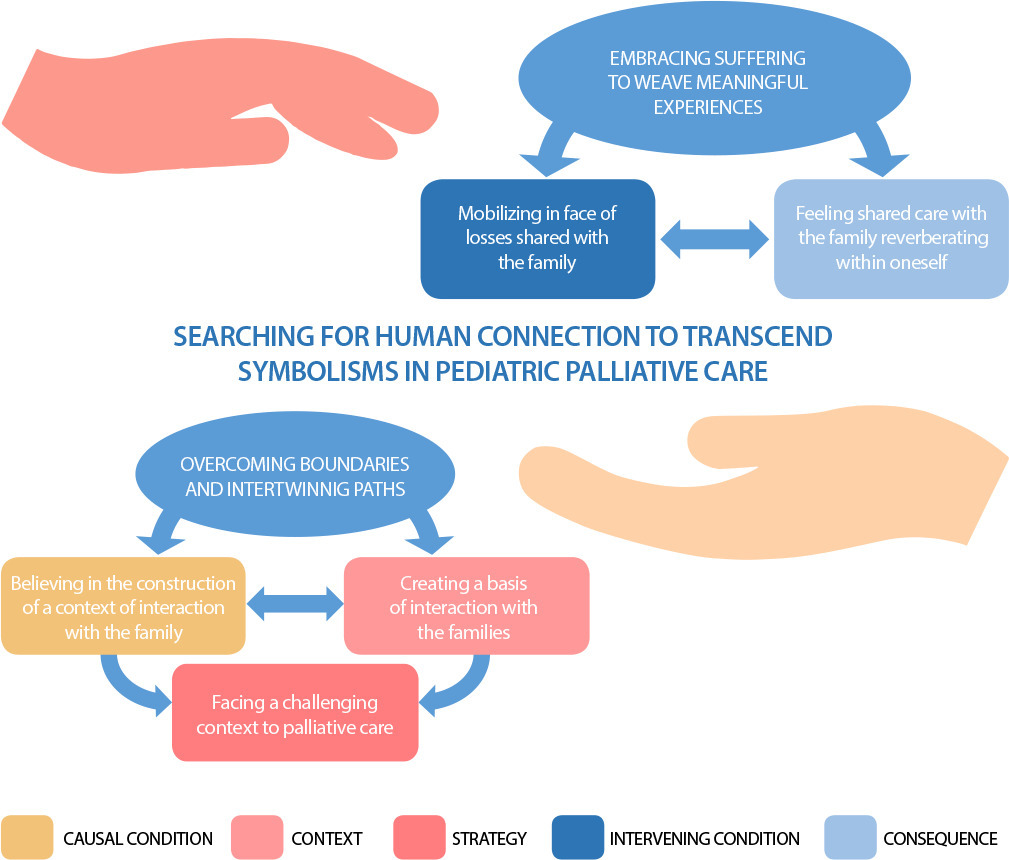
-
LETTER TO THE EDITOR06-26-2023
Striving for vessel health preservation through standardized assessment: a Letter to the Editor
Revista Brasileira de Enfermagem. 2023;76(3):e2023760301c
Abstract
LETTER TO THE EDITORStriving for vessel health preservation through standardized assessment: a Letter to the Editor
Revista Brasileira de Enfermagem. 2023;76(3):e2023760301c
DOI 10.1590/0034-7167.2023760301c
Views0Dear Dr Dulce Aparecida BarbosaEditor in Chief of the Revista Brasileira de Enfermagem[…]See more -
REVIEW06-26-2023
Barriers to Pre-Exposure Prophylaxis (PrEP) use for HIV: an integrative review
Revista Brasileira de Enfermagem. 2023;76(3):e20210963
Abstract
REVIEWBarriers to Pre-Exposure Prophylaxis (PrEP) use for HIV: an integrative review
Revista Brasileira de Enfermagem. 2023;76(3):e20210963
DOI 10.1590/0034-7167-2021-0963
Views0See moreABSTRACT
Objectives:
to identify and synthesize scientific evidence on the barriers and difficulties for Pre-exposure Prophylaxis (PrEP) use and compliance for HIV.
Methods:
an integrative literature review, using the MEDLINE/PubMed, Cumulative Index to Nursing and Allied Health Literature (CINAHL), Academic Search Premier and Scopus (Elsevier) databases.
Results:
all (100%) the articles included identified that PrEP users experience some type of structural barrier related to health services such as long distance from the units, suboptimal logistics for taking pills and professional resistance to prescribing PrEP. Furthermore, 63.21% identified social barriers, such as stigma about sexuality and HIV, in addition to individual barriers such as alcohol use, adverse effects, and concerns about long-term toxicity.
Conclusions:
the barriers to PrEP use are multifactorial. Effective interventions are needed to support PrEP users in accessing, complying with, and retaining health services.

-
ORIGINAL ARTICLE06-26-2023
Effect of video on satisfaction and self-confidence in simulation training: a randomized clinical trial
Revista Brasileira de Enfermagem. 2023;76(3):e20220366
Abstract
ORIGINAL ARTICLEEffect of video on satisfaction and self-confidence in simulation training: a randomized clinical trial
Revista Brasileira de Enfermagem. 2023;76(3):e20220366
DOI 10.1590/0034-7167-2022-0366
Views0See moreABSTRACT
Objectives:
to identify the effect on satisfaction and self-confidence of undergraduate nursing students after using a validated bed bath video during the simulation.
Methods:
blinded parallel randomized clinical trial. Participants were allocated to the control group (simulation with tutor) or intervention (simulation with video). After the interventions, the Student Satisfaction and Self Confidence with Learning Scale was used to assess satisfaction and self-confidence. The study was approved by the Ethics Committee and Brazilian Registry of Clinical Trials. Mann Whitney, Fisher Exact and Student t statistical tests were used. A significance level of 5% was adopted. Results: fifty eight students (30, control; and 28, intervention) were evaluated. There was no significant difference between the groups regarding satisfaction (p=0.832) and self-confidence (p>0.999).
Conclusions:
satisfaction and self-confidence were similar between the groups, and the two strategies could be used in the simulated practice of bed bathing.

-
05-29-2023
Absenteeism in child health services: a systematic review
Revista Brasileira de Enfermagem. 2023;76:e20210805
Abstract
Absenteeism in child health services: a systematic review
Revista Brasileira de Enfermagem. 2023;76:e20210805
DOI 10.1590/0034-7167-2021-0805
Views0See moreABSTRACT
Objectives:
to analyze data from qualitative studies related to the phenomenon of health follow-up dropout of newborns, infants and preschoolers in child health services.
Methods:
systematic review, carried out in 19 information bases. Studies were included that portray the reasons for dropping out health follow-up of children up to five years old. The JBI methodology was used for systematic reviews of qualitative evidence.
Results:
we identified 20,199 studies. After applying the eligibility criteria, 81 were selected. Seven were excluded due to duplicity, resulting in 74 articles that were read in full. After this phase, three articles were selected for the final sample and later after reading their references, one more was included, totaling four articles for critical analysis.
Conclusions:
the synthesized findings highlight that health follow-up dropout is based on personal knowledge and beliefs, the family routine dynamics and access to services.

-
ORIGINAL ARTICLE05-29-2023
Quality of life from women’s perspective in the exercise of sex work: a study of social representations
Revista Brasileira de Enfermagem. 2023;76:e20220169
Abstract
ORIGINAL ARTICLEQuality of life from women’s perspective in the exercise of sex work: a study of social representations
Revista Brasileira de Enfermagem. 2023;76:e20220169
DOI 10.1590/0034-7167-2022-0169
Views1See moreABSTRACT
Objectives:
to analyze the social representations elaborated by sex workers from Alto Sertão Produtivo Baiano about quality of life.
Methods:
a qualitative study, based on the Social Representation Theory, carried out in the region of Alto Sertão Produtivo Baiano, with 30 sex workers. Individual in-depth interview was carried out, with speeches organized in a corpus and treated in IRAMUTEQ, enabling lexical analysis for Descending Hierarchical Classification.
Results:
four thematic classes emerged, in which social representations of quality of life pervade: money earned to supply needs; association with healthy living and obtaining health (physical and mental); balance of emotions (although there are some negative sensations such as fear and anxiety); and faith in a deity.
Final Considerations:
the social representations elaborated by sex workers about quality of life are anchored in concepts, subjective and practical, punctuated by the World Health Organization.

-
ORIGINAL ARTICLE09-21-2020
Transcultural theory in nursing care of women with infections
Revista Brasileira de Enfermagem. 2020;73:e20190586
Abstract
ORIGINAL ARTICLETranscultural theory in nursing care of women with infections
Revista Brasileira de Enfermagem. 2020;73:e20190586
DOI 10.1590/0034-7167-2019-0586
Views0See moreABSTRACT
Objective:
To analyze how nurses consider, in their practice of healthcare, the sociocultural context of women with sexually transmitted infections.
Method:
Qualitative research, carried out in October 2017, with ten nurses working in teams of the Estratégia de Saúde da Família (Family Health Strategy). The data were collected through semi-structured interviews, subsequently transcribed, and submitted to the organization supported by the Discourse of the Collective Subject method and analyzed according to Madeleine Leininger’s transcultural theory.
Results:
Nurses identified the sociocultural aspects of women with sexually transmitted infections and recognized the presence of influencing factors: technological, religious, economic, political, and legal, kinship and social, cultural values, and lifeways.
Final Considerations:
The study found that the provision of care by nurses in Primary Health Care is close to the sociocultural aspects of these women when considering the beliefs and values of each individual, especially regarding the life context and their care experiences.
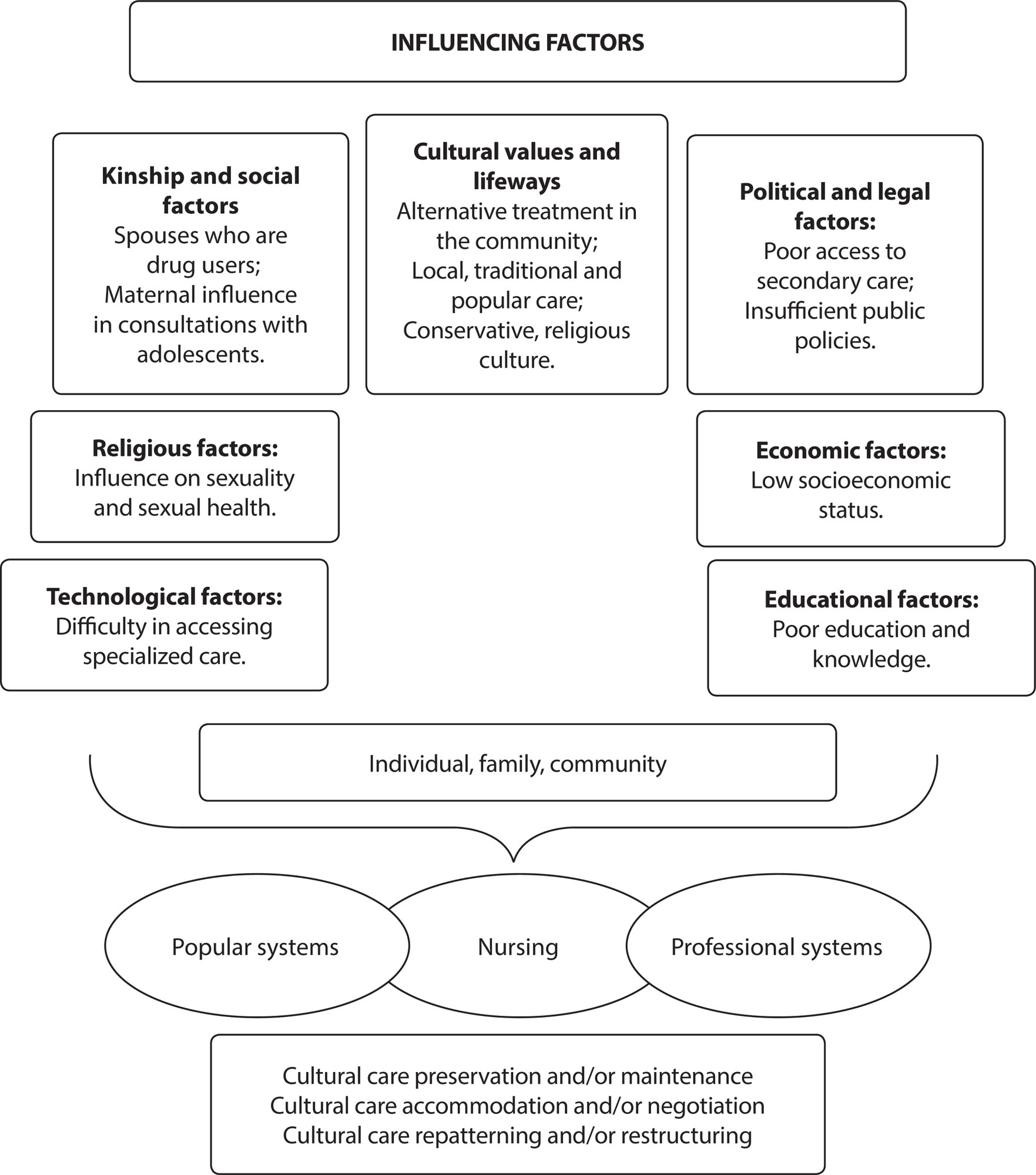
-
ORIGINAL ARTICLE11-15-2022
Reasons assigned to suicide attempts: adolescents’ perceptions
Revista Brasileira de Enfermagem. 2022;75:e20210163
Abstract
ORIGINAL ARTICLEReasons assigned to suicide attempts: adolescents’ perceptions
Revista Brasileira de Enfermagem. 2022;75:e20210163
DOI 10.1590/0034-7167-2021-0163
Views0See moreABSTRACT
Objective:
identify the reasons for attempting suicide from the perspective of adolescents.
Methods:
qualitative study conducted with ten adolescents who attempted suicide and were attending a Centro de Atenção Psicossocial Infanto-Juvenil located in a city in the south of Brazil. Semi-structured interviews were held in July 2020 using WhatsApp. Data were analyzed according to Minayo’s Content Thematic Analysis.
Results:
the adolescents’ reports listed the reasons that triggered suicide attempts, such as changes in the adolescents’ life cycle and violence, which led them to attempt suicide to solve problems.
Final considerations:
Data analysis revealed the reasons that triggered suicide attempts from the adolescents’ perspective and difficulties to cope with problems, probably explained by their lack of experience in dealing with frustrations and disappointments.
-
REFLECTION06-04-2021
Care in pediatric nursing from the perspective of emotions: from Nightingale to the present
Revista Brasileira de Enfermagem. 2021;74(4):e20200377
Abstract
REFLECTIONCare in pediatric nursing from the perspective of emotions: from Nightingale to the present
Revista Brasileira de Enfermagem. 2021;74(4):e20200377
DOI 10.1590/0034-7167-2020-0377
Views0See moreABSTRACT
Objective:
Reflect on the evolution of pediatric nursing care from the perspective of emotions, from the conceptions of Florence Nightingale to the present.
Method:
Reflective study based on theoretical and experiential aspects of emotional care in pediatric nursing.
Results:
From Nightingale, there were many definitions regarding the nursing care in an integrative and humanist logic; and with certain bond to emotional dimension. That time, nursing care was based on the religious conceptions of charity and love of our neighbor and, despite the conceptualization that shapes nursing science today, such conceptions have not ceased to be its attribute, mainly in the care of pediatric nurses.
Final considerations:
In pediatric nursing, nurture care with affection and facilitate emotions management in each interaction nurse-child-family is crucial for caring. This emotional care should evolve into a competence that recognizes the expertise and merit of professional action.
-
ORIGINAL ARTICLE04-03-2020
Analysis of the guiding rules of the nurse technician’s practice in Brazil
Revista Brasileira de Enfermagem. 2020;73(3):e20180322
Abstract
ORIGINAL ARTICLEAnalysis of the guiding rules of the nurse technician’s practice in Brazil
Revista Brasileira de Enfermagem. 2020;73(3):e20180322
DOI 10.1590/0034-7167-2018-0322
Views0INTRODUCTIONThe institutionalization of nursing as a profession is characterized by the division of labor, marked by discipline and hierarchy, with the participation of several active agents, among which we can cite the nurse, the nurse technician, the nursing assistant, and the nursing attendant. The latter, although mentioned in the legislation, has been extinct since the […]See more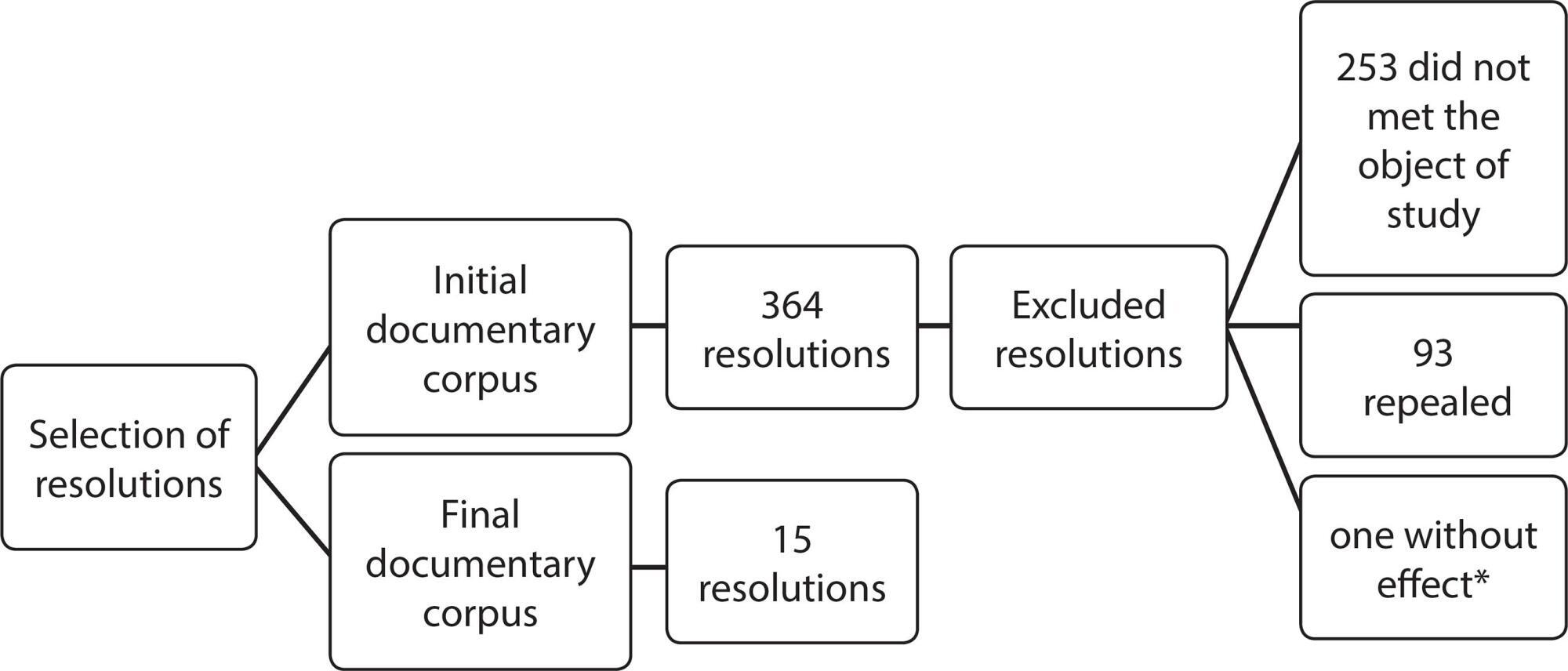
-
REVIEW09-06-2022
Biosafety measures to prevent COVID-19 in healthcare professionals: an integrative review
Revista Brasileira de Enfermagem. 2022;75(1):e20201191
Abstract
REVIEWBiosafety measures to prevent COVID-19 in healthcare professionals: an integrative review
Revista Brasileira de Enfermagem. 2022;75(1):e20201191
DOI 10.1590/0034-7167-2020-1191
Views0See moreABSTRACT
Objective:
to identify the main biosafety measures for preventing COVID-19 in healthcare professionals.
Methods:
this is an integrative literature review, with studies published between January and July 2020, on the MEDLINE/PubMed, Scopus, Embase, Web of Science, LILACS, SciELo, Wiley Online Library, Cochrane CINAHL databases. The selection of studies followed the PRISMA recommendations.
Results:
among the 2,208 publications identified, 12 studies comprised the sample, which enabled the analysis in four thematic categories: The importance of using recommendations about the use of personal protective equipment; The restructuring of new operational and clinical routines and flows in the practice of services; Monitoring professionals, especially testing; Conducting training.
Conclusions:
the phenomena involved are innumerable, covering operational management and the training of teams to deal with highly infectious pathogens and disease outbreaks.
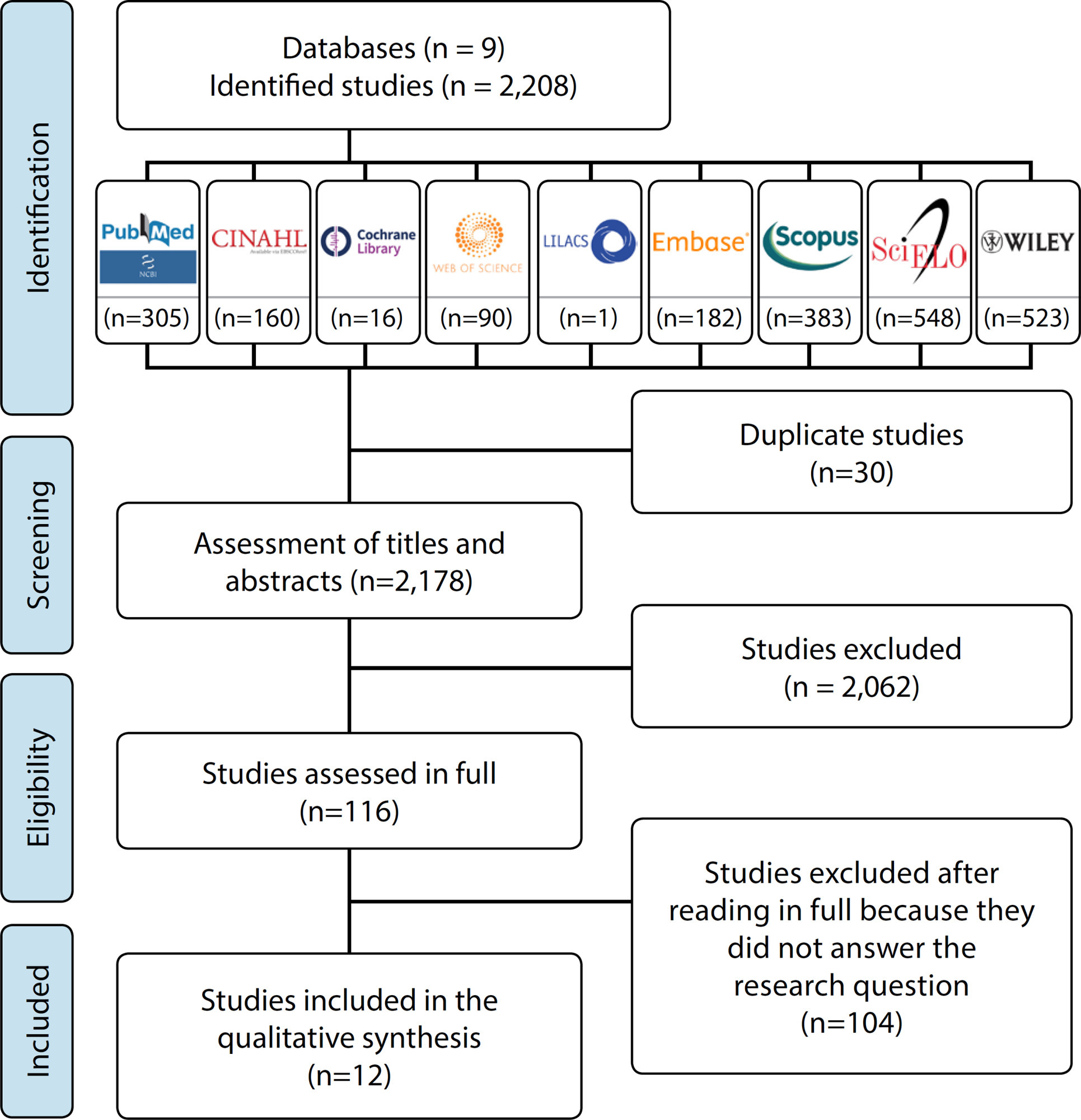
-
ORIGINAL ARTICLE09-21-2020
Organizational flow chart of home care for children with special health care needs
Revista Brasileira de Enfermagem. 2020;73:e20190310
Abstract
ORIGINAL ARTICLEOrganizational flow chart of home care for children with special health care needs
Revista Brasileira de Enfermagem. 2020;73:e20190310
DOI 10.1590/0034-7167-2019-0310
Views0See moreABSTRACT
Objective:
To develop a workflow protocol for Home Care (HC) services in the HC2 modality for children with special health care needs (CSHCN) in the state of Parana.
Method:
Quantitative, descriptive, exploratory, multiple case studies. Data was collected with professionals from the eight home care services in Parana. Data were analyzed using the Strengths, Weaknesses, Opportunities and Threats (SWOT) methodology, from which a 5W2H method of action plan was developed, resulting in a flow chart.
Results:
Considering the strategies found in Home Care services, such as planned hospital discharge, caregiver training, organized transportation and singular therapeutic project, a flow organization protocol for children with special health care needs in Home Care services was developed.
Conclusion:
The protocol developed makes it possible to organize the care provided to children with special health care needs in home care.
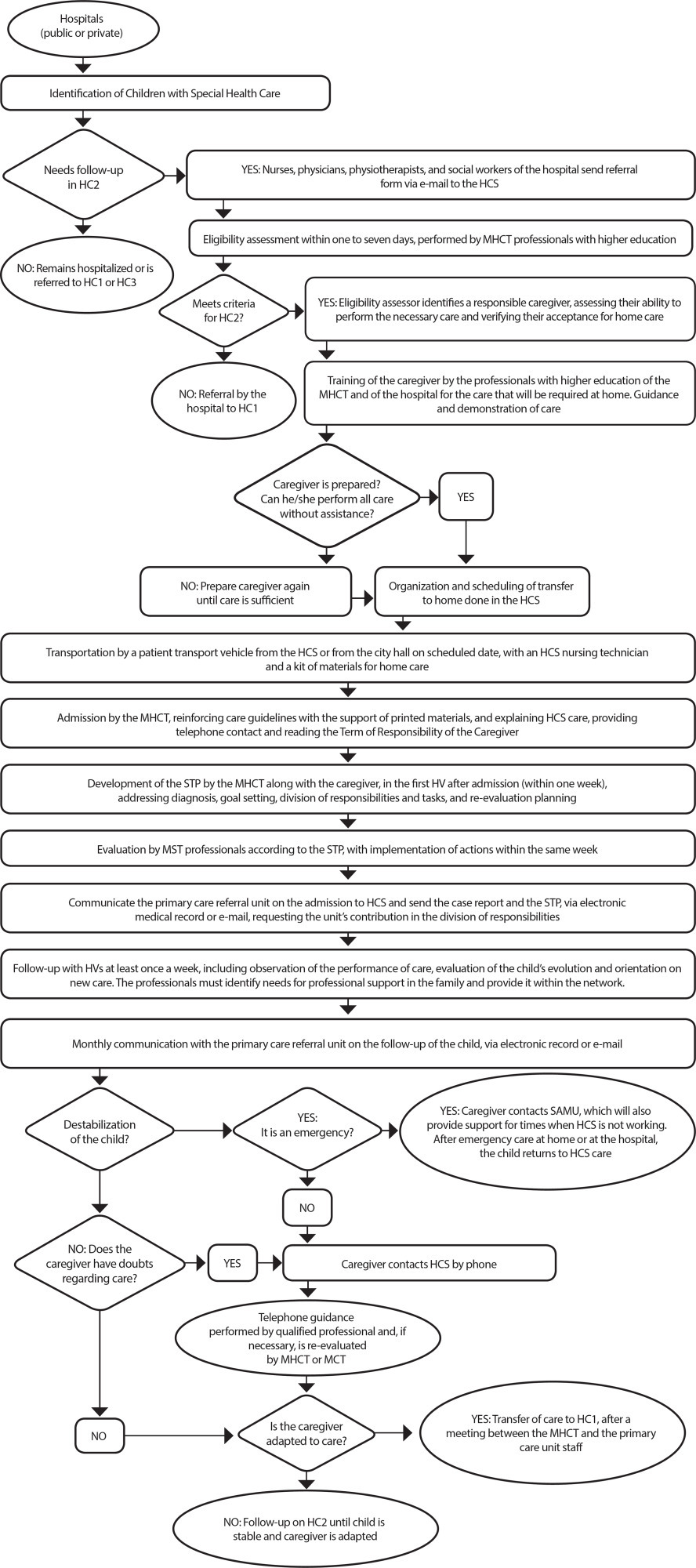
-
ORIGINAL ARTICLE02-10-2020
Relationship between quality of life, self-esteem and depression in people after kidney transplantation
Revista Brasileira de Enfermagem. 2020;73(1):e20180245
Abstract
ORIGINAL ARTICLERelationship between quality of life, self-esteem and depression in people after kidney transplantation
Revista Brasileira de Enfermagem. 2020;73(1):e20180245
DOI 10.1590/0034-7167-2018-0245
Views0See moreABSTRACT
Objective:
to assess the relationship between health-related quality of life with depression and self-esteem of people after kidney transplantation.
Method:
a cross-sectional study of 47 outpatients from October 2016 to February 2017. The following tools were applied: The Medical Outcomes Study 36-Item Short-Form Health Survey, Beck Depression Inventory and Rosenberg Self-Esteem Scale. Descriptive statistics and Spearman correlation were used.
Results:
women had lower scores for health-related quality of life. Young adults, people with up to one and a half years of transplantation and those who had dialysis for more than one year had higher scores.
Conclusion:
the health-related quality of life of people with chronic kidney disease after transplantation ranged from good to excellent. The presence of depression was not identified. The relationship of data indicates that the higher the quality of life, the better the self-esteem assessment.
-
03-19-2021
Life satisfaction and health self-assessment of older adults assisted through home care
Revista Brasileira de Enfermagem. 2021;74:e20200357
Abstract
Life satisfaction and health self-assessment of older adults assisted through home care
Revista Brasileira de Enfermagem. 2021;74:e20200357
DOI 10.1590/0034-7167-2020-0357
Views0See moreABSTRACT
Objective:
to identify sociodemographic and health characteristics according to age groups and to analyze the association between self-assessed health status and satisfaction with regular/bad life with sociodemographic characteristics, global functioning and falls of older adults linked to home care within the primary health care network.
Method:
cross-sectional study with 124 older adults, conducted using home interviews. A sociodemographic data and health status questionnaire was used, together with Barthel Index, Lawton Instrumental Activities of Daily Living Scale (IADL), the Mini-Mental State Examination, the Geriatric Depression Scale and the Timed Up and Go Test. Bivariate and multivariate analyses (Poisson regression) were applied.
Results:
there was a predominance of female octogenarians. Self-assessment of regular/bad health was associated with mild (p=0.002) and severe (p<0.001) depressive symptoms. Satisfaction with regular/bad life was associated with fear of falling (p=0.019) and with mild (p<0.001) and severe (p<0.001) depressive symptoms.
Conclusion:
depressive symptoms were associated with a worse life satisfaction and health self-assessment.

Search
Search in:
Nuvem de Tags
Enfermagem (930)Cuidados de Enfermagem (269)Atenção Primária à Saúde (239)Idoso (208)Educação em Enfermagem (151)Segurança do Paciente (150)Saúde Mental (145)Educação em Saúde (139)Estudos de Validação (131)Qualidade de Vida (104)Tecnologia Educacional (100)Promoção da Saúde (99)COVID-19 (91)Criança (91)Família (87)Enfermagem Pediátrica (86)Saúde do Trabalhador (86)Adolescente (85)Saúde Pública (82)Estudantes de Enfermagem (77)



